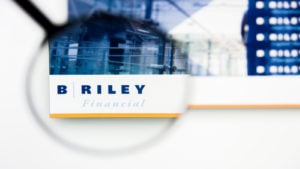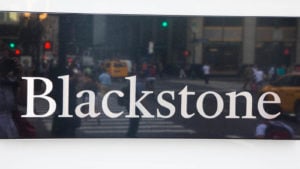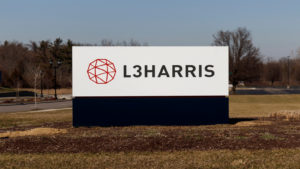The broad market indices are going down. But that doesn’t mean the entire market is headed down with them.
First, it pays to remember in times like these, that the big indices are price weighted. That means the higher the price of the stock, the more it affects the movement of the index.
Sometimes, one high-priced Dow Jones Industrial Average stock can drive the entire index down. Or up.
That’s why looking at the indices is helpful, like looking out the window to check the weather. It’s a snapshot.
But if you want winners, you have to dig deeper. And when the markets are down like they are now, if you can find the right stocks it’s a great time to grab them. They’re stocks that will perform if things get worse, or when they get better.
The seven ideal stocks to buy for cautious investors are all A-rated by my Portfolio Grader tool I use to find Growth Investor plays — even now.
Stocks to Buy: B Riley Financial (RILY)

B Riley Financial (NASDAQ:RILY) is an interesting company because it is built to take advantage of both good and bad markets.
It has a few divisions and they are either interconnected or operate siloed. One piece provides private equity to small- and midsize-firms in the U.S. market. The second provides auction and liquidation services to companies. And the third is a valuation and appraisal unit that larger financial institutions can hire to figure out the value of properties they are interested in buying or shutting down.
For example, a retailer may want to expand from its one store to a handful of stores in various states. RILY funds them. Then, say that the U.S.-China trade war was hurting the retailer’s sales.
RILY would step in with its valuation unit and look for ways to sort out the issue. If it can’t find a viable path forward, it would arrange to wind the business down and auction off the goods and properties.
Each division has specific upside in both good and bad markets. And it was built via acquisitions precisely for this purpose.
The stock is up 37% in the past 12 months and offers a 2.9% dividend. It should stay plenty busy moving forward.
Hercules Capital (HTGC)

Hercules Capital (NYSE:HTGC) is a company similar to RILY in that it offers private equity to firms. The difference is that Hercules focuses on tech, life sciences and renewable energy companies.
It’s an alternative financial company, meaning it will fund projects that may not meet the criteria traditional banks would have for lending. Many of these firms popped up after the financial crisis in 2008, but HTGC has been around since 2003, funding Silicon Valley startups in the wake of the burst tech bubble.
It now has a $1.6 billion market capitalization and strong reputation in the industry. Unlike RILY, HTGC’s sole focus is as an alt-lender. But this is a growing sector, since these firms don’t have all the regulation that traditional financial institutions have.
That means they can create better deals and have more wiggle room on terms, which is a very attractive option for young firms. And those new startups are popping up left and right. Going forward, they’ll be fueled by a huge technological innovation whose name you’ve probably heard — but not its magnitude.
The stock has a huge dividend, currently paying 8.8%.
Blackstone Mortgage Trust (BXMT)

Blackstone Mortgage Trust (NYSE:BXMT) is set up as a real estate investment trust (REIT), but it doesn’t own properties. It originates the senior debt on commercial properties. From those deals it generates net income that it pays to investors as dividends.
REITs were on a tear until late in 2019, but now picking them is more selective. And BXMT is one that still has strong potential moving forward.
This isn’t about speculating on real estate values, it’s about buying into an expanding economy.
While the coronavirus from China may slow growth for a quarter or two, the fact is, the U.S. economy is still the strongest in the world. And that means other countries are buying into solid stocks that are built for the long term. That’s BXMT.
The stock is up 5% in the past 12 months, but it also has a reliable 6.7% dividend on top of that performance.
Ball (BLL)

Ball (NYSE:BLL) has been around since 1880. While you might think that the company makes Ball jars, that’s no longer the case.
It has licensed its name and that particular product line for decades.
Ironically, it now makes cans. And it has for many, many years. It also has an aerospace division.
As for the can business, think about walking the aisles of your grocery store. There are a lot of cans there. And they’re not going away. This chunk of business may not be a massive growth engine, but it’s a solid revenue generator. And it’s a global leader. Almost all the cans in Brazil are made by Ball.
During World War II Ball thought it might be a good idea to diversify its business lines and got involved in the war effort, especially in its aftermath when the Cold War ramped up.
Ball is now a significant player in the expanding C4ISR mission of the military.
The stock is up 26% in the past year and has a 0.8% dividend. And I’ve got more where that came from.
Hershey (HSY)

Hershey (NYSE:HSY) should be a recognizable name to anyone who has lived in the U.S. for the past decade or more. It is one of the leading confectioners in the U.S. and around the world.
But it’s more than Hershey’s chocolate, Reese’s, Kit Kats and Twizzlers. It has also branched out to healthier alternatives as well. It now owns SkinnyPop and Pirate’s Booty among its other 80 brands.
The company has been around since 1894 and is still headquartered just outside of Harrisburg, Pennsylvania, in — of course — Hershey, Pennsylvania. It has an amusement park there as well. And given its central location in the Mid-Atlantic and Northeast, it has a constant flow of soccer, lacrosse and other sporting tournaments going all year long.
HSY stock has a $31 billion market cap, so it’s not a little confectioner. This is a major company but it has a strong social conscience and prefers to be responsible about its growth and sustainable as a corporation.
The stock is up 30% in the past year and it offers a dividend just a hair over 2%.
L3Harris (LHX)

L3Harris (NYSE:LHX) is a newly merged company that combines two of the United States’ top companies that are focused on defense and aerospace technologies.
They both have decades of experience when it comes to everything from secure handheld telecoms equipment to satellite and cyber defense tech.
As the world looks to space for its next-level opportunities, it’s companies like LHX that will be go-to partners with not only governments, but also private companies that are now in the Space Race. This industry is going to grow significantly in the coming decade.
By combining, LHX has become a major player in this sector and it can now garner much more work than it did when both competed against each other or each won a piece of the same contracts.
It now sports a $45 billion market cap and is a major player in its own right. The stock is up 21% in the past 12 months and it has a 1.5% dividend. While LHX is a more unique telecom company, everyone in that industry has a fire lit under them by the latest tech breakthrough powering ultrafast wireless speeds — and great investments now.
Zoetis (ZTS)

Zoetis (NYSE:ZTS) has been around since 1952 and it specializes in making animal health medicines and vaccines.
Before this coronavirus hit, the big story was the African swine fever that was running wild in China, killing more than half its pigs. It is so virulent that any pig that tests positive is slaughtered.
This sent pork prices sky high in China and it was having a real effect on the economy, slowing growth and raising inflation.
Although the story has changed from ASF, it’s still a real issue. And many similar diseases are out there. ZTS has been working on an ASF vaccine for over a year now, so you can imagine the potential.
We see what happens to biotech stocks when they announce they may have a vaccine for the coronavirus, which most reports say kills less than 3% of those who contract it.
Viruses are productivity issues and that makes them economic issues. ZTS may be a new name to you, but it has a $64 billion market cap. That goes to show that institutional investors know how important its business is.
The stock is up 40% in the past year and has a small, 0.7% dividend.
Soon, however, “cautious” investing won’t be the buzzword. Bullish trends are about to come back into play, both economic and logistical, like fund managers performing end-of-quarter “window dressing” — so don’t be surprised to see everyone jump back on the bandwagon of growth investing. Those of us in the know can lay our own groundwork now — and here’s a great place to start:
The 5G Buildout Is an Incredible Opportunity for Investors Right Now
Within two years, most cell phones will be 5G enabled and be able to wirelessly handle television streaming. With 5G, we’ll have cable modem speeds on any device; no need to plug in. That’s a big deal for rural areas … the very same areas that are also key to President Donald Trump’s reelection. So, by pushing 5G over the goal line, Trump will deliver a big win for his base — and strike a blow against Chinese rivals like Huawei Technologies.
But, in the big picture, 5G is about much more than trade wars and faster downloads. Because 5G is 100 times faster than 4G, it’ll allow your internet devices to work in real time. That advancement is a game changer for tech companies.
With the 5G infrastructure market set to grow at an annual rate of 67% over the next 10 years, the entire market will go from $780 million to nearly $48 billion. This buildout is where I see opportunity with 5G stocks now.
Cable companies can do their best to fight back with fiber optics … but they can’t compete with the convenience of a smartphone, once it’s got ultra-fast 5G. That’s how my 5G infrastructure play will capture more market share from the broadband cable companies.
The stock I’m targeting is enjoying an influx of big money on Wall Street, and it has strong fundamentals, too — making it an A-rated “Strong Buy” in my Portfolio Grader system.
When you do, you’ll see how to claim a free copy of my new investment report, The Netflix of 5G, which has full details on this company — and what makes it such a great buy now.
Louis Navellier had an unconventional start, as a grad student who accidentally built a market-beating stock system — with returns rivaling even Warren Buffett. In one recent feat, Louis discovered the “Master Key” to profiting from the biggest tech revolution of this (or any) generation. Louis Navellier may hold some of the aforementioned securities in one or more of his newsletters.
